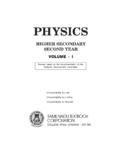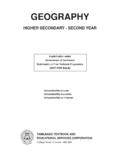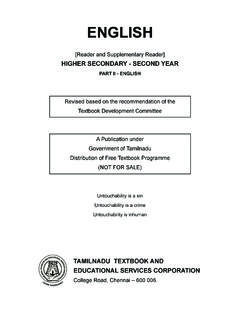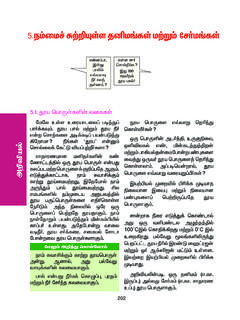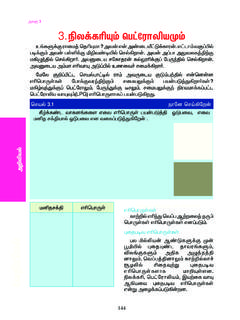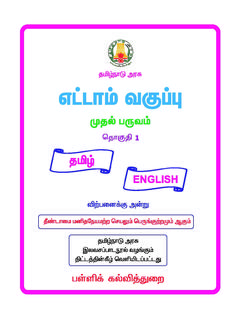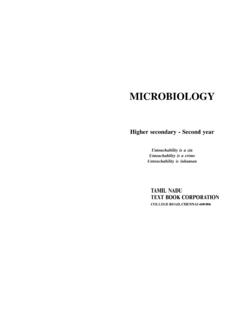Transcription of POLITICAL SCIENCE - Textbooks Online
1 POLITICAL SCIENCE . HIGHER SECONDARY- SECOND YEAR. A Publication under Government of Tamilnadu Distribution of Free Text book Programme (NOT FOR SALE). Untouchability is a sin Untouchability is a crime Untouchability is inhuman TAMILNADU TEXTBOOK AND. EDUCATIONAL SERVICES CORPORATION. College Road, Chennai - 600 006. Government of Tamilnadu First Edition - 2005. Revised Edition - 2017. CHAIRPERSON. Dr. S. Subramanian Former Professor and Head Department of POLITICAL SCIENCE Madurai Kamaraj University Saraswathi Illam, # 46, Chetty Street Ayanavaram, Chennai REVIEWERS. Dr. Viswanathan Dr. A. Karuppan Reader in POLITICAL SCIENCE Lecturer (Selection Grade). Presidency College, Chennai POLITICAL SCIENCE Presidency College, Chennai AUTHORS. Dr. K. Palanisamy Kumaresan Raja Guest Faculty Lecturer in POLITICAL SCIENCE Anna Centre for Public Affairs Annamalai University University of Madras, Chennai Annamalai Nagar Dr.
2 G. Sundararaman Mrs. G. Vasumathi Post-Graduate Teacher Assistant Headmistress ( POLITICAL SCIENCE ) Tarapore and Loganathan Govt. Hr. Sec. School Hr. Sec. School for Girls Pallavaram, Chennai Ayanavaram, Chennai Price : This book has been prepared by the Directorate of School Education on behalf of the Government of Tamilnadu This book has been printed on 60 GSM Paper Printed by Offset at: ii Preface Society enables man to achieve talents and qualities by virtue of which he can make progress and acheive superiority over other living beings. Politics helps to resolve social conflicts in society and help man to live in harmony with other fellow beings. POLITICAL SCIENCE deals with man in relation to the state and government. POLITICAL SCIENCE is a branch of study which is concerned with POLITICAL aspect of man's life in society as distinct from the economic, philosophical, ethical and other aspects. The 12th syllabus has been revised in tune with changed social, POLITICAL and economic situations.
3 The content of the syllabus has more contemporary relevance of the topics it has presented and prepared to test the knowledge of the students in relation to the problems of governance and POLITICAL participation. A new outlook of the syllabus includes the international dimension of politics such as globalisation and India in the year 21st century. Careful attention has been paid in linking last year syllabus to the second year. By studying POLITICAL SCIENCE as an optional subject at the higher secondary level the students are motivated to compete for civil services examination both at state and union level. Goals and Objectives A. Goals To promote a critical understanding of the POLITICAL concepts and systams. To prepare students for more effective and responsible critizenship;. To prepare students for further higher study in POLITICAL SCIENCE , law and journalism B. Objectives The students will have demonstrated the ability to: Compare cross-nationally the forms and incidence of POLITICAL participation, processes of interest articulation aggregation including interest groups and POLITICAL party systems, formal decision-making processes including legislative-executive relations and the roles of the judiciary and the bureaucracy, and policies including civil liberties, welfare and national security.
4 A clear understanding of what is the appropriate role of the supreme Court in reviewing the constitutionality of legislation is also highlighted. iii It identifies and explains the changes in the international system, the nature and cause of international conflict and method of conflict resolution the conditions for alliance formation and dissolution strategies for international bargaining and negotiation the role of transnational and, international organizations and multinational corporations, and the nature of the cleavages between. East and West and between North and South. The authors of the lessons and members of textbook committee express their appreciation to the authorities of High Secondary Education of Tamilnadu Government for entrusting them with this task. Chairperson and Committee Members iv SYLLABUS. 1. Development of State City state Feudal state Nation state Socialist state Welfare state 2.
5 Theory of the Origin of the State Divine origin theory Social contract theory Matriarchal theory Patriarchal theory Force theory The historical theory 3. New POLITICAL SCIENCE Meaning and nature of the concept Uses of POLITICAL power Nature and importance of authority Nature and uses of influence 4. Challenges to State Sovereignty Erosion of national sovereignty Globalisation and challenges to state sovereignty 5. Forms of Government Unitary Federal Parliamentary Presidential v Collegiate Modern dictatorships Distinction between unicameral and bicameral legislature 6. Judiciary Need and importance of judiciary Qualifications for judges. Judicial review Judicial activism Independence of judiciary 7. Indian Government and Politics Salient features of Indian Constitution Organisation of Central Government President Prime Minister Council of Ministers Speaker Parliament - Rajya Sabha Parliament - Lok Sabha Supreme Court Indian POLITICAL parties 8.
6 Organisation of State Government - Tamilnadu Governor Chief Minister Council of Ministers Legislature High Court including subordinate judiciary State Secretariat District Administrative Structure vi 9. Local Self Government in Tamil Nadu Structure of Local Self Government in Tamil Nadu Urban Municipal Corporations Municipalities Townships Cantonments Town Area Committees Notified Area Committees Rural Three Tier Panchayat System District Development Council Panchayat Union Gram Panchayat Functions of Panchayat bodies Evaluation of working of the Panchayat Raj System 10. India in the 21st Century Present position Plans for the future vii CONTENTS. Page 1. Development of State 1. 2. Theory of the Origin of the State 20. 3. New POLITICAL SCIENCE 33. 4. Challenges to State Sovereignty 42. 5. Forms of Government 52. 6. The Judiciary 65. 7. Indian Government and Politics 75. 8. Organisation of State Government - Tamilnadu 107.
7 9. Local Self Government in Tamilnadu 134. 10. India in the 21st Century 161. viii CHAPTER 1. DEVELOPMENT OF STATE. The State occupies the most important place among all social institutions. It is the keystone of the social arch , as Laski says. In the words of Finer the state is the supreme social frame work . Without state there would be chaos and confusion in the society. It is not only a natural but also a necessary institution. It exists to control and regulate the behaviour of the human beings. It protects the weak against the strong, maintains peace and order and serves the common good life of all individuals. Man cannot live without the state. This lesson is about the evolution of the state. The state is the result of a slow and steady growth extending over a long period and has many stages in its development. Different factors produced different types of states in different societies. It is difficult to show the stages of evolution which the modern nation state had to undergo during its emergence.
8 The process of the evolution of the state has not been uniform. In the early period there were the Oriental empire, Greek city-state, the Roman Empire, the Feudal state, the Nation state, socialist state and welfare state. The following typologies of state are described below: (1) City State, (2) Feudal State, (3) Nation- State,(4) Socialist State and (5) Welfare State. CITY STATE. After the Oriental Empire there was the City-State in Greece around 1000 In fact, POLITICAL theory may be said to begin with the Greek City-States. The Greek City-States were the first communities to have given conscious thought to politics . Although the Greek POLITICAL institutions were probably not unique, yet they presented the most fully developed instance of a way of life and government for which evidence is available. When the Greeks settled in Europe, they were divided into local communities organised on the primitive model according to clans and tribes.
9 Each clan and tribe occupied distinct valleys and islands into which Greece was broken up by sea and hills. These valleys and islands, over the lapse of time, became centers of POLITICAL life sharply different from the Oriental Empires. From the history of the Greek City-States, and especially from the history of Athens, we can trace how the tribal administration gradually gave place to the local principle in government, and how the local community was developed into the City-a new POLITICAL type of governance. The Greek City was a true 1. State in the modern sense of the term in which the POLITICAL , economic, intellectual, and moral life of the people was focussed on the central city. With the Greek City-State two ideas were integral. Each City was a politically organised State independent of others and proud of its independence. The Greeks never thought, and perhaps it was foreign to their nature, to merge their identify in any other City and to make a large unit of POLITICAL administration.
10 Secondly, the Greek City-State was deliberately limited in size and population. According to Greek POLITICAL philosophy, the concentration of POLITICAL , social and intellectual life at one central city was possible only when the State was small. Aristotle put definite limitations on the population and size of the State. He held that neither ten nor a hundred thousand could make a good State, because both these numbers were extremes. He laid down the general principle that the number should be neither too large nor too small. It should be large enough to be self-sufficing and small enough to be well governed. The Greek City-State developed to the stage of a conscious effort directed to the realisation of liberty and equal laws. It was a great experiment not only in the art of self-government, but also in quest of virtue. To be a citizen of the State did not merely imply, in the Greek view, the payment of taxes and the casting of a vote.
